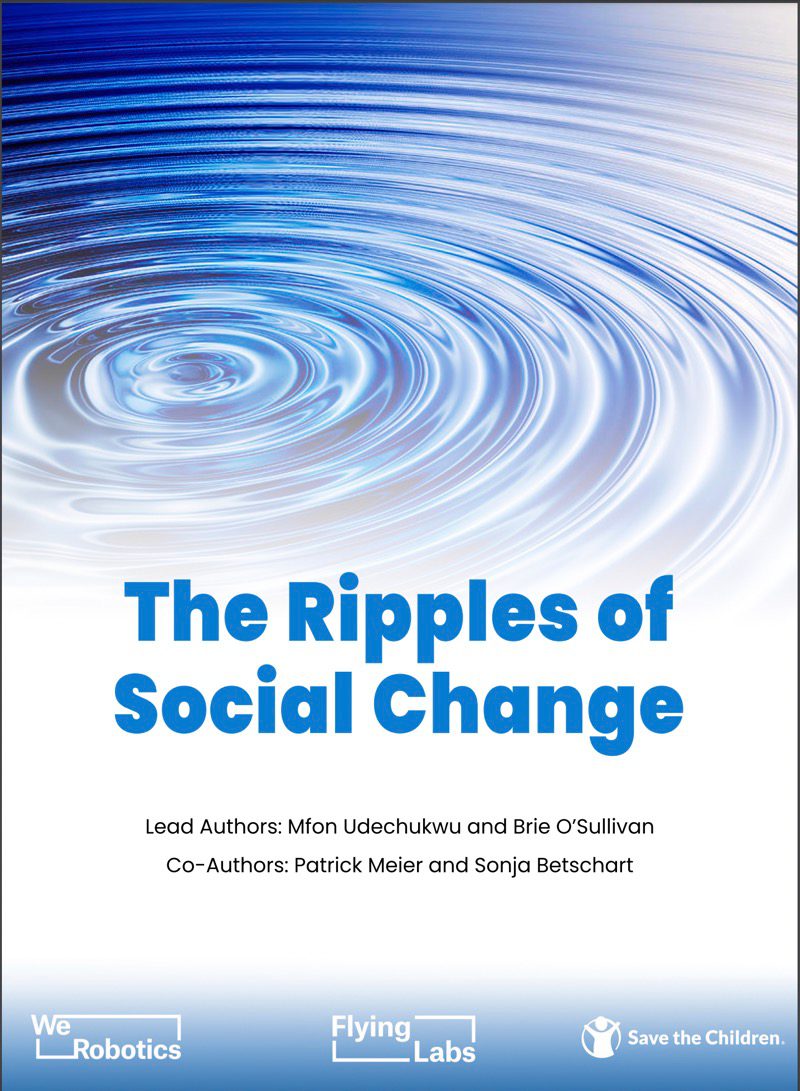
Identifying & Measuring the ‘Ripples of Social Change’
November 28th, 2022

We are excited to announce the launch of our research project, "The Ripples of Social Change," in partnership with Save the Children Sweden.
This project aimed to discover and measure potential diffuse ripple effects generated by Flying Labs' activities, especially those that travel beyond the immediate ecosystems they were initially developed. Although these ripples are more fluid and less tangible than Flying Labs' short and medium-term impact, they serve as important early indicators of possible systems change.

Social good programs are designed and implemented to address a specific problem or set of problems where their immediate- and medium-term impact tends to be relatively straightforward to measure. However, the longer-term result of many social good efforts is more socially diffuse over geography and time, making measurement more challenging. But understanding longer-term impact is just as important as assessing the impact over shorter time horizons. Moreso, having local experts lead in measuring the diffuse impacts generated by their projects and activities further reinforces the importance for international organizations and donors to shift power to local experts, empowering them with the tools and resources to effect change within their communities.
We embarked on this project because we believed Flying Labs might be keen to discover, follow, and measure the more diffuse ripple effects they generate. The ripples may include greater trust and validation of local expertise, a shift in mindsets, narratives and discourse around localization, and shifting power.
Our first step in the Ripples Project was conducting two literature reviews on monitoring and evaluation (M&E) and systems change to identify existing methods or frameworks we could employ to measure the ripple effects generated by Flying Labs. While significant literature on M&E and systems change generally exists, few explicitly focus on technology for social good projects or measuring secondary and tertiary impacts.
Over four months, WeRobotics and the selected Flying Labs members from Senegal, Nepal, Tanzania, Zambia, Papua New Guinea, Haiti, Panama, and South Africa Flying Labs collaborated through several co-creation sessions. In these sessions, Flying Labs presented insights from the literature reviews and brainstormed new ways to identify and measure possible ripple effects from their activities at home. Flying Labs subsequently applied the framework developed in the co-creation sessions with its stakeholders to measure ripples that travel beyond the Flying Labs Network.
Flying Labs applied the framework developed in the co-creation sessions with its stakeholders to measure ripples that travel beyond the Flying Labs Network.
The stakeholder engagement involved semi-structured interviews with diverse informants to identify and trace any ripples that propagated beyond the Flying Labs Network. In addition, WeRobotics and eight Flying Labs conducted a pilot study of this project to establish the ripple effects of Flying Labs projects and activities in their communities. After the stakeholder engagements, Flying Labs presented their findings and insights from their framework application, and WeRobotics then documented these findings and insights into a final report. One theme in the stakeholder engagement analysis underscored the importance of continuously learning, adapting, and reflecting on global efforts in solving social problems.
We recommend implementing the detector model with other Flying Labs in the Network, and definitely over a more extended period to ensure that the full detector can be used. Because local challenges are complex, more than one action is needed to address them. Every issue is entangled with so many factors that it can't be solved with a single solution. Most Flying Labs who participated in this project have already noted that the knowledge and insights gained from the ripples project are shaping their thinking and strategic partnerships.
Recent Articles

